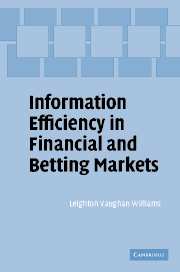Book contents
- Frontmatter
- Contents
- List of figures
- List of tables
- List of contributors
- Introduction
- Part I The concept of information efficiency
- Part II Selected readings
- 4 An assessment of quasi-arbitrage opportunities in two fixed-odds horse-race betting markets
- 5 The presence of favourites and biases in bookmakers' odds
- 6 Searching for semi-strong form inefficiency in the UK racetrack betting market
- 7 Models, markets, polls and pundits: a case study of information efficiency
- 8 Longshot bias: insights from the betting market on men's professional tennis
- 9 Biases and insider trading in exotic bets on thoroughbreds
- 10 On the improbability of information efficient parimutuel betting markets in the presence of heterogeneous beliefs
- 11 Modelling gambling demand in a laboratory casino: discovering the importance of individual-specific effects
- 12 Market efficiency of the 50–30–20–10 horse-racing spread betting market
- 13 Insider trading and bias in a market for state-contingent claims
- 14 Rationality and efficiency in lotto games
- 15 Efficiency of the odds on English professional football matches
- 16 Modelling distance preference in flat racing via average velocity
- 17 Testing for market efficiency in gambling markets: some observations and new statistical tests based on a bootstrap method
- 18 Information (in)efficiency in prediction markets
- Index
- References
9 - Biases and insider trading in exotic bets on thoroughbreds
Published online by Cambridge University Press: 09 July 2009
- Frontmatter
- Contents
- List of figures
- List of tables
- List of contributors
- Introduction
- Part I The concept of information efficiency
- Part II Selected readings
- 4 An assessment of quasi-arbitrage opportunities in two fixed-odds horse-race betting markets
- 5 The presence of favourites and biases in bookmakers' odds
- 6 Searching for semi-strong form inefficiency in the UK racetrack betting market
- 7 Models, markets, polls and pundits: a case study of information efficiency
- 8 Longshot bias: insights from the betting market on men's professional tennis
- 9 Biases and insider trading in exotic bets on thoroughbreds
- 10 On the improbability of information efficient parimutuel betting markets in the presence of heterogeneous beliefs
- 11 Modelling gambling demand in a laboratory casino: discovering the importance of individual-specific effects
- 12 Market efficiency of the 50–30–20–10 horse-racing spread betting market
- 13 Insider trading and bias in a market for state-contingent claims
- 14 Rationality and efficiency in lotto games
- 15 Efficiency of the odds on English professional football matches
- 16 Modelling distance preference in flat racing via average velocity
- 17 Testing for market efficiency in gambling markets: some observations and new statistical tests based on a bootstrap method
- 18 Information (in)efficiency in prediction markets
- Index
- References
Summary
This chapter examines exotic bets in Australian thoroughbred wagering to identify market anomalies and derive an estimate of the extent of insider trading. The analysis tests whether these markets are what Fama (1970) termed ‘strongly efficient’, which means monopoly information cannot be used profitably.
Although bookmakers operate in Australia, over 95 per cent of bets are placed with one of three parimutuel operators or totalisators (‘Tote’). They accept bets up until the start of a race, then deduct a fixed proportion of the pool to cover taxes and operating costs, and divide the balance between winning bets.
All investors on the Tote receive the same odds. It is thus in the interests of skilled bettors and insiders to hide their bets so that they do not reveal their strategy to the less informed public and risk ‘herd behaviour’ and a fall in the odds. One way to achieve this is through ‘exotic bets’ whose odds (and hence volume invested) are not available to the betting public as is the case with win and place bets. Exotics include: exactas, where bettors pick the first two horses in their finishing order; quinellas, in which bettors pick the first two horses in any order; and trifectas (called a tierce in Hong Kong), where bettors pick the first three horses in their finishing order. There is considerable anecdotal evidence that professional punters invest a substantial portion of their bets on exotics, including articles in the popular press (e.g. Kaplan, 2002) and personal communication with betting operators.
- Type
- Chapter
- Information
- Information Efficiency in Financial and Betting Markets , pp. 231 - 246Publisher: Cambridge University PressPrint publication year: 2005
References
- 3
- Cited by

